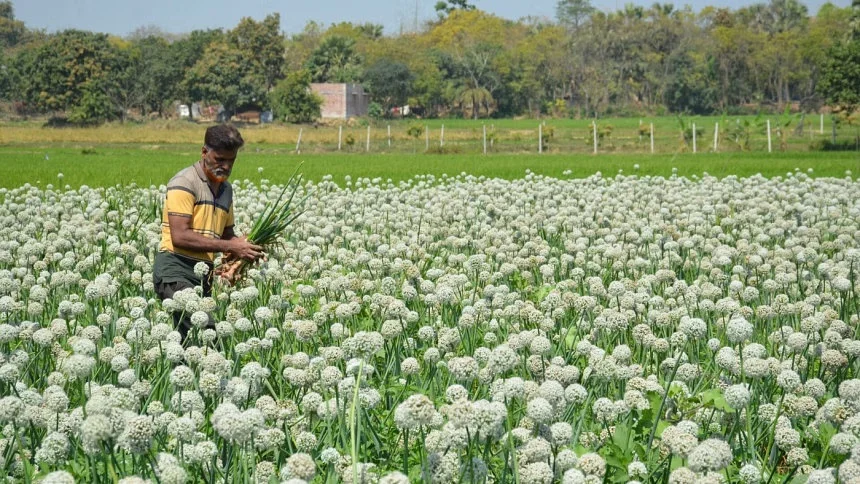Onion seeds may get expensive for low yield
Share on:

Onion seeds are often referred to as "black gold" by farmers in the Rajshahi region due to their dark shade and high market value.
This stands true for the fact that when planting ran from October to early December last year, the seeds were sold at an average of Tk 5,000 per maund in the district, some 250 kilometres west of the capital.
On top of this, weather conditions were unfavourable this year, for which local agriculturalists and farmers apprehend that yields will be low this year, causing prices to further surge.
The life cycle of this crop begins with the planting of the seeds in seedbeds, followed by their transplantation to larger fields in around 30 days.
Onions can be harvested after around two months but to avail the seeds, farmers have to wait a little longer, around two more months, for the flowers to bloom.
This year farmers in Rajshahi cultivated onion seeds on 271 hectares of land, up 12 hectares from that last year, when around 124 tonnes of seeds were harvested.
This year the harvests are just weeks away and growers are anticipating a challenging season, as the costs have nearly doubled.
Abu Taleb of Pali village in Durgapur explained that each bigha of land required 16 maunds (one maund equals around 37 kilogrammes) of seeds.
Taking into account last year's rates, he has had to buy Tk 80,000-worth seeds for each bigha of land and there are additional expenses of fertilisers and farmhands.
However, assures Taleb, seed prices can fall during harvests to as low as Tk 1,500 per maund, meaning the cost for planting each bigha of land can go down to Tk 24,000, on condition a farmer has stocks in hand.
Farmers said this year there has been low pollination due to a decline in the number of bees, hampering production. And in March, crops were further damaged by rain and storms.
Md Zulfikar Haider Prodhan, chief scientific officer of Spice Research Centre, said most wild bees have moved to litchi orchards while the overall bee population has reduced due to urbanisation and use of chemicals.
"We haven't seen as many bees this season as last year," said Md Shamim Akter of Dorgapara village in Godagari upazila.
"We had additional expenses to fight the calamities, so losses will be incurred if higher prices are not available this year," said Nantu Sheikh, a grower from Durgapur upazila.
Sheikh cultivated onion seeds on 50 bighas of land, including six bighas of his own land, and supplied around 500 maunds of seeds to various parts of the country each season.
Extra labourers for hand pollination and bamboo fences to protect flowers from storms have added to the costs.
"Onion seed farming is like gambling. If everything goes well, you will earn a fortune, but if it rains and there are storms, there will be a total loss," said Shahadat Hossain of Durgapur, highlighting the unpredictable nature of onion seed farming.
Despite the risks from natural calamities, the increasing demand for onion has spiked interest among farmers in Rajshahi's Durgapur, Godagari, Puthia, Bagmara, and Mohonpur upazilas, according to Md Mozdar Hossain, deputy director of Rajshahi's Department of Agricultural Extension (DAE).
He said there were at least a dozen seed sellers at the wholesale level who are supplying seeds across the country.
On another note, around 25,17,070 tonnes of onions were produced on 507,557 acres of land around the country in fiscal year 2021-22, according to the Bangladesh Bureau of Statistics.

